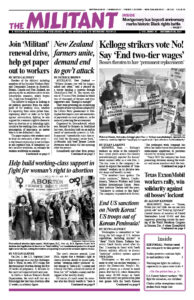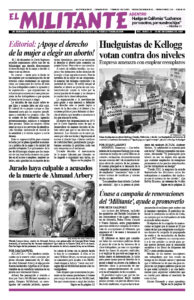Washington is committed to “utilizing the full range of U.S. defense capabilities, including nuclear” to “deter” North Korea, Defense Secretary Lloyd Austin stated after his Dec. 2 meeting in Seoul with South Korean military officials to discuss “updating” military options against North Korea.
Washington — the only government to ever use nuclear weapons — paints the Democratic People’s Republic of Korea as a threat to world peace. But the U.S. rulers themselves keep some 28,500 troops in South Korea and carry out provocative joint war games with the South Korean military. They frequently send nuclear-weapons capable planes and ships to the region, and maintain control of South Korean troops in case of war.
Backed by the U.N. Security Council, Washington began imposing draconian trade and banking sanctions in 2006 aimed at forcing the North Korean government to bow to U.S. demands to end its nuclear programs. The sanctions ban North Korea from selling coal, its key export, or importing natural gas. Oil imports are severely restricted.
As a result, millions of workers and farmers face severe hardships, including food shortages. These have been exacerbated following the decision of the North Korean government to close its borders in January 2020 to protect the country from the spread of COVID-19. In the last few months trade with China has resumed, although still not near pre-pandemic levels.
In 2018 then President Donald Trump and North Korean leader Kim Jong Un held a series of talks that opened the possibility of an accord that could lead eventually to the denuclearization of the Korean Peninsula. The North Korean government dismantled some nuclear facilities and ceased testing intercontinental ballistic missiles. Washington and South Korea suspended or scaled back their annual joint war games. But the U.S. government never eased the sanctions and the talks ended without an agreement.
President Joseph Biden’s administration has not attempted to push for more talks. It stepped up military exercises on the peninsula in August that Trump had previously suspended.
The government of North Korea has stated it would end its nuclear weapons program if Washington signs a peace treaty to formally end the 1950-53 Korean War and pledges not to attack in the future. More than 4 million people died in that war, including at least 2 million Korean civilians, more than a half million Korean combatants, hundreds of thousands of Chinese troops, and more than 36,000 U.S. soldiers.
The war began after Washington and the Stalinist regime in Moscow joined in dividing the country in two, against the will of the Korean people. U.S. troops occupied the South and imposed the bloody dictatorship of Syngman Rhee in an attempt to halt a revolutionary struggle sweeping the peninsula. In the North workers and farmers began taking over factories and land from wealthy families and overturned capitalist rule.
In response to these advances by working people, U.S.-led forces dropped massive amounts of napalm and other bombs, leveling the North and large parts of the South. The Rhee dictatorship killed tens of thousands of political prisoners, and peasants were imprisoned for demanding land. But the regime was unable to crush the resistance of workers and peasants.
In the first ever military defeat for U.S. imperialism, the Korean people, with the aid of Chinese volunteers, fought U.S. invading forces to a stalemate. An armistice was signed in 1953, but Washington refuses to sign a peace treaty to this day.
Trying to bolster his party’s image before presidential elections in March, South Korean President Moon Jae-In has been working with Washington and Beijing to agree on a declaration that the war has ended. But according to Korea Times, the plan includes a clause that would make the declaration purely symbolic, “thus allowing the United Nations Command in South Korea and U.S. Forces Korea to remain as they are today.”
“The U.S. is touting ‘diplomatic engagement’ and ‘dialogue without preconditions,’” noted Kim Jong Un in a speech to the North Korean legislature in September, “but it is no more than a petty trick for deceiving the international community and hiding its hostile acts.”
Working people in the U.S. “can and will be won to opposing brutal imperialist sanctions and wars,” Steve Clark wrote for the Socialist Workers Party in a Sept. 9 letter to the North Korean government. “We stand in solidarity with the Korean people’s struggle to reunify the country and restore Korea’s national sovereignty.
“We demand that the U.S. government immediately and unconditionally: lift all economic and banking sanctions against the DPRK” and “End its ‘nuclear umbrella’ over South Korea and Japan.”

